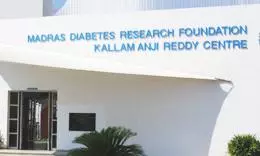
Tamil Nadu: ICMR sets up India's first diabetes biobank in Chennai

New Delhi, Dec 15 (PTI) The country's first diabetes biobank, a repository of population-based biological samples aimed at supporting scientific research, has been established in Chennai by the Indian Council of Medical Research (ICMR) in collaboration with the Madras Diabetes Research Foundation (MDRF).
The biobank set up at the MDRF, Chennai aims to gather, process, store and distribute biospecimens to assist scientific studies with the permission of the ICMR.
The biobank will facilitate advanced research on the causes of diabetes, the variations of the Indian type of diabetes and related disorders, said Dr V Mohan, chairman of the MDRF and Dr Mohan's Diabetes Specialities Centre.
The biobank has blood samples from two ICMR-funded studies -- the ICMR-India Diabetes (ICMR-INDIAB) study conducted in all states and Union territories in phases from 2008 to 2020 and the "Registry of people with diabetes in India at a young age at the onset", which was launched in 2006 and is still ongoing.
A plethora of blood samples of different types of diabetes in the young, such as Type 1, Type 2 and gestational diabetes, have been stored for future studies and research, Mohan said.
The process of setting up the biobank started around two years ago.
The details of the biobank and the purpose behind setting it up have been explained in detail in an article published in the "Indian Journal of Medical Research" last week.
Biobanks are critical in biomedical research, collecting, processing, storing and distributing biospecimens to support scientific research, the article said.
"This diabetes biobank could help in the identification of novel biomarkers for early diagnosis and the development of personalised treatment strategies," it added.
Additionally, it would support longitudinal studies to track the progression of diabetes and its complications over time, leading to better management and prevention strategies.
"By fostering collaborative research efforts, a diabetes biobank in India could significantly advance our understanding of the disease and contribute to the global fight against the diabetes epidemic," the article said.
Involving private agencies in developing biobanks and research is essential for translating research into practice. Adopting new technologies for specimen storage, preservation, data management and sharing is crucial for creating a cost-effective, long-lasting disease-specific biobank in India.
Of the various biobanks available globally, the most well-known is the UK Biobank, supported by the National Health Service (NHS), which is a vast biomedical database with genetic, lifestyle and health information from five lakh participants in the United Kingdom.
The collected information comprises phenotypic, genomic and imaging data derived from direct assessments, verbal interviews, online questionnaires and electronic health records.
This dataset continues to expand as new biomedical data are added through ongoing assessments and longitudinal follow up.
The ICMR-INDIAB study is one of the large epidemiological studies on diabetes with a sample size of 1.2 lakh nationally-representative individuals, covering every state of India.
This cross-sectional, community-based study was done in adults of either sex aged 20 years in phases from 2008 to 2020, and sampled 33,537 urban and 79,506 rural residents in 31 states and Union territories.
The study reported that the prevalence of diabetes and metabolic NCDs in India is greater than the earlier estimates, with 10.1 crore individuals diagnosed with diabetes and 13.6 crore with prediabetes.
Hypertension, generalised and abdominal obesity affected 31.5 crore, 25.4 crore and 35.1 crore people respectively. Additionally, 21.3 crore people had hypercholesterolemia and 18.5 crore had high LDL cholesterol. The study also indicated that the diabetes epidemic is stabilising in more socio-economically advanced states but rising in less-developed states.
The study found that less than 10 per cent of Indians engage in recreational physical activity, highlighting the need to promote physical activity.
Only 43.2 per cent of the population has heard of diabetes, emphasising the need for large-scale diabetes awareness and education programmes.
Rural-to-urban migration is associated with an increased risk of diabetes and cardiometabolic abnormalities.
As for the "Registry of people with diabetes in India with young age at onset" study, 5,546 participants with youth onset diabetes were enrolled (49.5 per cent males, 50.5 per cent females) from 205 centres linked to eight regional cancer centres (RCCs) across the country.
Type 1 and Type 2 were the most common forms of diabetes found. The mean age at diagnosis was 12.9 ± 6.5 years for T1D and 21.7 ± 3.7 years for T2D.
Half of the T1D cases were registered within six months of onset, while 47.3 per cent of the T2D cases were registered after three years and 56.1 per cent had already had at least one hospitalisation by the time of registration, the study found. PTI

